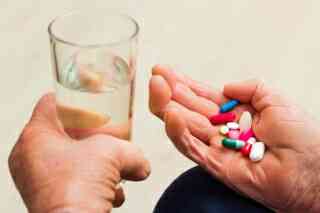Medication Side Effects on Oral Health
What Medications Can Affect Your Oral Health?
Many prescription medications, including some vitamins, herbal supplements, and minerals, can have negative effects on oral health. It is important to ensure your dental professional has access to recent medical information and history, which should include a full list of any medications and vitamins you are taking—both prescription and over-the-counter. There are some common side effects on oral health that individuals can experience from these items, and they can include:
Altering Taste – Some vitamins and medications can cause a metallic or bitter taste in the mouth and may even affect the tongue’s ability to taste. Some of the most common medication types that cause this reaction include stimulants for the central nervous system, cardiovascular agents, respiratory inhalants, nonsteroidal anti-inflammatories, and nicotine patches and other smoking-cessation products.
Unusual Bleeding – Reduced blood clotting is a common side effect of anticoagulants, such as warfarin and heparin as well as different types of aspirins. These types of medications are most often used to help prevent heart disease or strokes, but they can also cause issues with bleeding during oral treatments or surgeries, such as tooth extractions and periodontal disease treatments.
Overgrown or Swollen Gum Tissue – Enlarged or overgrown gum tissue is also called “gingival overgrowth” and can be associated with medications like phenytoin and other anti-seizure medications as well as medications taken after organ transplants. Additionally, gingival overgrowth can be a side effect of calcium channel blockers that are most often prescribed to heart patients.
Soft Tissue Reactions – Some medications have been known to cause oral issue inflammation, discoloration, and the development of oral sores. Some of the medications known to have these effects include immunosuppressive agents, medications used to control blood pressure, chemotherapeutic agents, and some commonly prescribed oral contraceptives.
Dry Mouth – Dry mouth is a side effect of many different medications, both those that are prescribed and those that can be purchased over-the-counter. Among the medications that can cause dry mouth are decongestants, antihistamines, painkillers, muscle relaxers, medication for high blood pressure, urinary incontinence drugs, antidepressants, medications for Parkinson’s disease, and many others.
Depending on what types of medications or vitamins you are taking, it is possible to experience one or more of the side effects explained above as well as a few other negative effects not discussed here. Make sure to let your dental professional know of any medications or vitamins you are taking and inform him or her of any negative oral side effects you may be experiencing.
If you have any questions regarding the side effects of medication, you can always consult your dentist and sign up for our New Hampshire Individual Discount Dental Plan to save as much as 20 percent on all your dental bills. For more information, please click here.
Copyright: barabasa / 123RF Stock Photo











